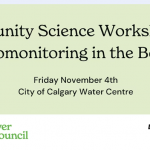The Columbia Mountains Institute of Applied Ecology’s Annual Researchers’ Forum: Water Monitoring for Watershed Security in the Canadian Columbia Basin Presentation
| Other | |
| October 17, 2022 at 1:00 pm to 5:30 pm (America/Edmonton) | |
| office@cmiae.org |
REGISTRATION FULL
The Columbia Mountains Institute of Applied Ecology (CMI) is hosting their Annual Researchers’ Forum from October 17th-18th with the central theme of this year’s event being environmental restoration. This gathering provides an opportunity for discussion around ecological projects taking place in southeastern British Columbia, such as field trials, new restoration projects and their associated community initiatives, ecosystem monitoring and research, etc.
Living Lakes Canada’s Founder and Executive Director Kat Hartwig will be presenting at this event. She will be discussing Living Lakes Canada’s pilot implementation of a coordinated water monitoring network within three hydrologic regions of the Columbia Basin. This Columbia Basin Water Monitoring Framework project uses an innovative methodology that can be replicated in other regions, to better understand the state of watersheds and the actions required to maintain their integrity in consideration of climate impacts.
Living Lakes Canada has facilitated the preliminary research and community engagement required to implement this project. Launched in 2021, an open-source water database (the ‘Columbia Basin Water Hub’) is used by 40+ stewardship groups; municipal, regional and Indigenous governments; environmental professionals and industry to share and access current and historical water data. A Priority Monitoring Matrix for selecting monitoring sites within each of the hydrologic regions was developed based on scientific rationale combined with community feedback. Local Reference Groups were created in each of the pilot areas so participants could identify key community concerns and priorities. Hydrologic modelling and data gap analysis was also completed in the target hydrologic regions. Prioritized monitoring based on science and informed by community water priorities ensures that monitoring addresses both community and scientific needs in a nested, cost-efficient manner. Equipment installation in all three pilots will be completed in Fall 2022, and next steps are to scale up the project and expand across the Basin region. This is planned as a 10-year project that has received significant funding from the Province of B.C.
A number of other Living Lakes Canada monitoring programs feed into this larger monitoring Framework with data also housed on the Columbia Basin Water Hub. Groundwater data is currently being collected through the Columbia Basin Groundwater Monitoring Program, high elevation data is being collected through Kootenay Watershed Science and a pilot High Elevation Monitoring in Kokanee Glacier Provincial Park program; data from lake foreshore surveys to assess the rate of change through the Foreshore Inventory Management Planning program; and biomonitoring data through our STREAM project. All of these programs contribute to a greater understanding of our water and watersheds.
Registration for the forum is now full. For more information about this event please contact Hailey Ross at office@cmiae.org.
For more information about the Columbia Basin Water Monitoring Framework or Living Lakes Canada’s various programs please contact our Communications Director Nicole Trigg at communications@livinglakescanada.ca.





